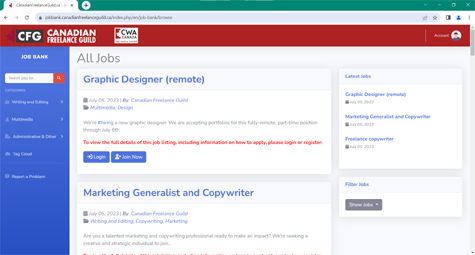by Lesley Evans Ogden
Assemble any group of freelancers at a networking event, or Google “freelance challenges,” and a common set of discussion topics tends to emerge.
How can we write the best pitches? How do we negotiate contracts? And for some: How do I get started?
Navigating freelance challenges to survive and thrive in the gig economy was the focus of a highly interactive workshop held recently in Winnipeg, Manitoba on Treaty 1 lands, the original lands of Anishinaabeg, Cree, Oji-Cree, Dakota, and Dene peoples, and homeland of the Métis Nation.
Though part of the Science Writers and Communicators of Canada 2019 conference, the tips that emerged are relevant to freelancers more broadly.
Freelancers of all experience levels worked in small groups, prompted with a series of discussion questions, and shared experiences, challenges, and solutions. Small groups then shared key tips with the wider group.
Topics summarized here are common pitfalls of freelancing, and pitching. The session was conceived and facilitated by Canadian freelancers Lesley Evans Ogden and Niki Wilson. Big thanks to all attendees of Freelance Skill Share Extraordinaire on May 25, 2019. Our crowd-sourced words of wisdom are captured below.
Pitfalls of freelancing
What’s been your experience navigating real or perceived conflict of interest issues?
Conflict of interest is an issue freelance writers are likely to encounter occasionally or frequently depending on the type of work they take on. For example, if you’re writing for journalism outlets as well as communications employers, you need to disclose potential biases and perceived or real conflicts of interest.
If you’re being paid by an industry or government agency or business or university to do writing for them, many venues are not okay with you turning around and writing about those same places in a journalistic context. Different venues have different rules and ethics around this, so the key is transparency.
Be honest. Be upfront. And think about the potential repercussions of saying yes to some contracts, because it could put you in a position of having to say no to others, and limiting your options.
What are some tips for getting paid, well, on time, and regularly?
Always have a contract. If you’re not provided with one, write one. There are lots of contract templates available online. At the very least, have an emailed letter of agreement. Include a kill fee. Read your contract carefully! There's lots more to read about contracts here on Story Board.
Other common pitfalls of freelancing come down to money problems like lags in getting paid. Late payment is problematic because we all have bills to pay. Look carefully at payment terms your client is committing to. (If there's nothing, add it). Add in some language around what your late payment fee is if those terms are not met. Regarding working for low pay, the general consensus was -- don’t do it! Sharon Oosthoek reminded the group that, “You can die of exposure.”
Charge what you’re worth. Don’t undervalue your work. And regarding the erratic income problem, many discussed getting a retainer client that is reliable. Regular assignments can be your "bread and butter" gigs.
How do you get your workflow in the “Goldilocks zone” (not too little, not too much)?
Spokesperson for her group, Carolyn Brown said “That’s impossible, it can’t be done.” Which met with validating laughter around the room. Work flow tips included using technology to manage and plan time as best you can. Get good at estimating the time it will take to do something. Track your time. Negotiate more time or a higher fee if the scope changes. You can find more time management tips here.
Other tips: Clarify client expectations – how in depth do they want or need, how many interviews are required or desired? Ask for per diems – relevant in some gigs like teaching or consulting – which can be nice income supplements.
If you have too much work flowing in, up your rates. Let the client decide if they want to continue working with you or not. When negotiating a possible contract, give options – find out what their budget is and tell them what you can offer for that budget.
Avoiding Burnout
Rank your clients on their PITA (pain in the ass) factor versus money, prestige, etc (more on that here), and think about saying no to things or getting rid of clients with high PITA factors (e.g. late payment could be one aspect of this) if the other benefits versus costs don’t add up.
Promoting your work
Have a website. They don’t often lead to work but they’re good as a landing place for information when searching. They're also valuable for networking.
If you’re into social media, don’t just Tweet to your friends. Tweet to the people who you work for and who you interviewed. They will ‘push’ your work out to a larger network. “Because honestly, I just have my mother,” said Kevin Mogk, prompting more group laughter.
“It’s a start,” said Carl Williams, supportively.
Pitching
Where to find resources for sample pitches and how to write a pitch
Check out The Open Notebook and the Science Writer’s Handbook. Find and read writer’s guidelines pages. Do your homework. Know what they’ve published recently. Know your target audience. Get the editorial calendar and timeline of the place you’re pitching so you know what’s seasonally appropriate. For example, magazines might be planning their April issue in November.
Getting feedback on pitches -- creating a support network
Find a friend that you trust, and workshop things in partners or in groups. Run ideas by people. Keep track of your ideas. Keep pitch ideas in a database. Some use Google Drive, One Note, EverNote. There are some other idea-storing tips here.
Consider signing up for Pitch Slams. They're traditionally held at Science Writers and Communicators of Canada meetings, also at the Society of Environmental Journalists, National Association of Science Writers, and the World Conference of Science Journalists. Film festivals often have pitching events too. Opportunities for instant feedback from editors and producers is really helpful.
Shared pitching nightmares
These include fear of the silent void (no reply to a pitch) and getting scooped on a story idea.
Tips: Make it clear it’s a pitch in your email title. Give editors a deadline to get back to you.
Don’t be a flake. Editors need reliable freelancers. If you keep saying yes and reliably turning in copy, you’ll get repeat business. Sometimes that leads to assignments even without pitching.
Networking
Talk to scientists. Go to conferences. Build a network.
As a result of muzzling under Canada’s previous federal government, many scientists started doing their own media (e.g. blogs) – so there may be opportunities to write directly for scientists.
Rejection
Don’t take rejections personally. It’s not about you or your ability or even your story. It might not be the right place for it. Or it might not click for a particular editor.
But our group of writers acknowledge it’s not easy on the self-esteem and confidence to get multiple pitches rejected – which is another reason it’s useful to have a buddy system, a mentor, and/or a group of fellow freelancers to share the ups and downs with -- in person, at the pub, or online.
Also, suggested Carolyn Brown, “have a life, with friends unrelated to this miserable business of freelancing,” which met with more empathetic laughter.
~~
Lesley Evans Ogden is a freelance multimedia science journalist writing from the suburbs of Vancouver, British Columbia, Canada or wherever her curiosity takes her. She writes for a variety of publications including Natural History, BioScience, New Scientist, BBC Future, Science, Nature, and Scientific American. Stay at Home Animal Dads, a documentary she conceived, pitched, and worked on as writer and co-director with Rotating Planet Productions, aired December 2018 on CBC’s The Nature of Things.




